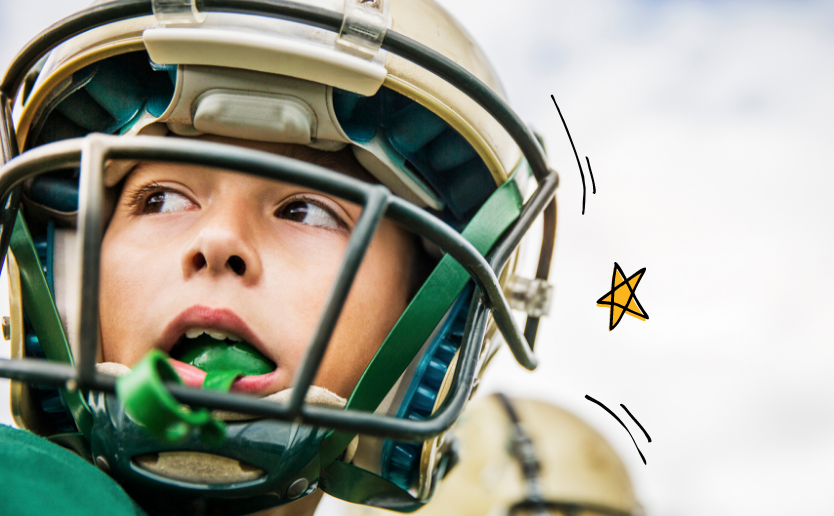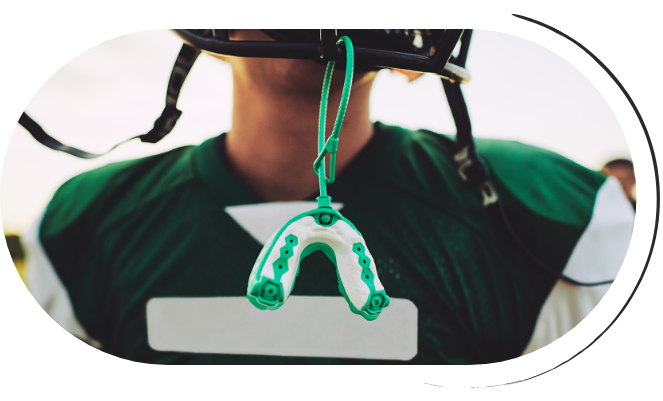
Mouth guards and Dental Care for Sports Injury Prevention
You might think it’s just fast-paced, high-contact sports such as hockey or lacrosse where a player is likely to get a tooth knocked out. But research shows that dental injuries are common across a wide range of youth sports, including ones that you might think of as “safer.” A properly fitted mouthguard is one of the best ways to prevent dental trauma and sports-related dental injuries for young athletes.
Safety Through Mouth Guards
The children’s dental experts at Park Dental’s locations throughout the Twin Cities, greater Minnesota and western Wisconsin can help teach your child about the importance of mouthguards for dental care and provide custom-fitted protection to ensure maximum safety of your child’s teeth.

How Mouth guards Protect Teeth
Americans lose more than 5 million teeth every year. Not all those injuries are in children, and many are caused by something other than sports. However, the risk of dental trauma from athletics remains high.
Wearing mouthguards lowers the risk of dental injuries such as losing a tooth or cracking a crown. By providing cushioning and protection, a mouthguard absorbs shock during impact, protecting the teeth and jaw. Injuries to permanent teeth are expensive, resulting in multiple dental visits, and may require a lifetime of follow-up care.
How Mouth guards Protect Teeth
While mouthguards prevent many problems, a mouthguard may not always protect against soft tissue injuries, such as a split lip. Still, protecting the teeth from smashing into the lips can minimize the impact of some injuries. Research has also shown that wearing mouthguards may reduce the risk of concussion.
What Sports Need Mouth guards?
The American Dental Association recommends that people wear mouthguards when participating in the following sports, whether for school or recreation:
- Acrobatics
- Basketball
- Bicycling
- Boxing
- Field hockey
- Football
- Gymnastics
- Handball, racquetball and squash
- Horseback riding and other equestrian events
- Ice hockey
- Inline skating
- Lacrosse
- Martial arts
- Rugby
- Shot put, discus and other field events
- Skateboarding
- Skiing
- Softball
- Volleyball
- Water polo
- Weightlifting
- Wrestling

Why Mouthguard Fit Matters
There are three types of mouthguards:
• Custom-fabricated mouthguards made by a dentist
• Mouth-formed, a.k.a. “boil and bite,” mouthguards
• Unmodified stock mouthguards
Unmodified stock mouthguards are not fitted to your child’s teeth, so your child must clench the guard to keep it in place. They provide less protection than other mouthguards and may not be appropriate for certain children
How Mouth guards Protect Teeth
An over-the-counter boil-and-bite mouthguard offers better protection and is more likely to stay in place. If your dentist recommends this type of mouthguard, make sure to purchase one with the ADA Seal of Acceptance. This ensures it has been tested and evaluated for safety.
While having a Park Dental general dentist make a custom mouthguard may cost more money up front than buying a mouthguard at a drugstore, the protection it provides is far superior to other mouthguards, and you may save money on costly dental injuries in the long run. Custom-fitted mouthguards are also more comfortable to wear.
Request an appointment with a family dentist you can trust at a Park Dental location near you.